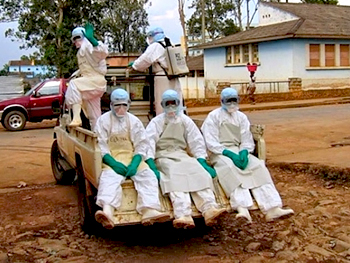 New Delhi, Aug 13: Four Indian doctors, who claim they are being forced to treat Ebola patients against their will in Nigeria, want to return home and appealed to the Indian government to facilitate this.
New Delhi, Aug 13: Four Indian doctors, who claim they are being forced to treat Ebola patients against their will in Nigeria, want to return home and appealed to the Indian government to facilitate this.
The Abuja-based Indian private hospital Primus where they are working, meanwhile, appealed to them not to abandon their duties.
The Indian High Commission in Nigeria is also in touch with the four doctors and Primus hospital so that both sides could arrive at an amicable solution.
The doctors claim that their passports have been taken away and they are being threatened against leaving the country, a charge denied by the Primus hospital in the Nigerian capital Abuja.
"The Indian High Commissioner is in touch with the doctors. Both the hospital and the doctors have agreed to come to an amicable solution," sources in the Ministry of External Affairs (MEA) said.
The sources said there was no major issue as the hospital is also owned by Indians.
They said the hospital is also correct when they say that there are no cases of Ebola in Abuja.
The MEA Spokesperson Syed Akbarudin said the Indian High Commissioner A R Ghanshyam had explained to him that the four doctors are not inclined to stay back in Nigeria and would like to return.
The Spokesperson appealed to the doctors to have patience, saying the High Commissioner is focusing to resolve the matter as early as possible.
"We are waiting outside the High Commission premises for the past 34 hours," said Dr Dinesh, one of the doctors. "We want our passports back. I cannot live here," Dr Yogesh said in a voice choked with emotion.
The Primus hospital has issued an advisory to all its doctors working in Abuja to continue offering medical services "in the best interest of humanity". "Unfortunately, in a state of panic, one orthopedic surgeon working at Primus hospital, Abuja, Nigeria abandoned his services and is alleged to have left Abuja committing medical negligence though he was bound by the medical ethics to provide care to patients admitted under him.
"Another four doctors (general surgeon, intensivist, anesthetist and physician) want to leave the hospital on the pretext of Ebola Virus Alert after admitting patients requiring intense medical and surgical management," said Dr ND Khurana, Chief Operating Officer of Primus hospital here.
"This will bring bad name to India. Ethically and legally, they are duty bound to render their services uninterruptedly but they are shirking their duty in this hour of need," he said. Khurana said as per his knowledge, no such type of virus (Ebola) has been yet detected nor any patient admitted in any hospital in Abuja. The information circulated by WHO is of preventive nature and the public healthcare workers are required to observe safety measures as per standard guidelines, he added.
As per the hospital, only two patients were detected to be affected by Ebola at Lagos several days ago and till date no fresh case has been reported. Lagos is at a distance of over 800 km from our hospital in Abuja, Khurana said.
The current outbreak, described as the worst since Ebola was first discovered four decades ago, has now killed 1,013 people. Cases have so far been limited to Guinea, Liberia, Sierra Leone and Nigeria, all in west Africa.





Comments
Add new comment